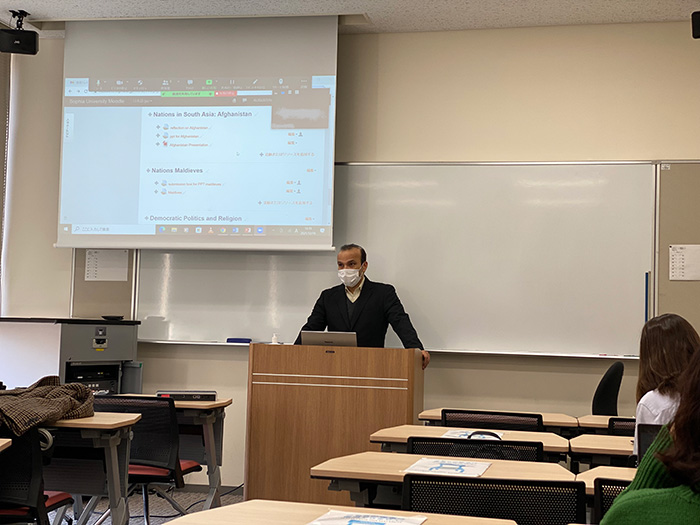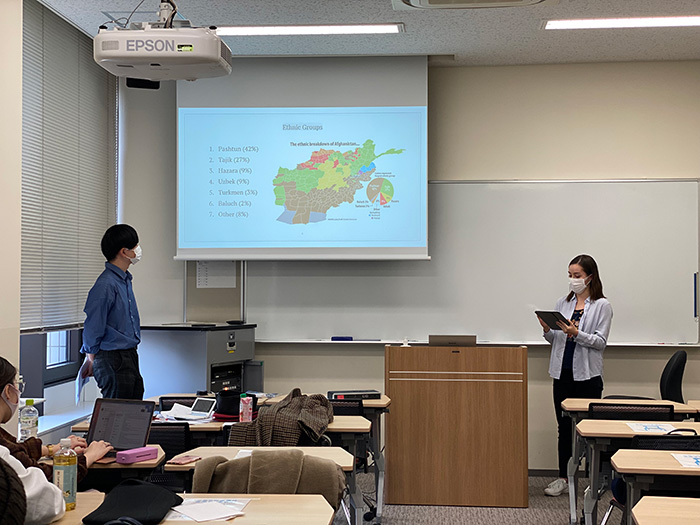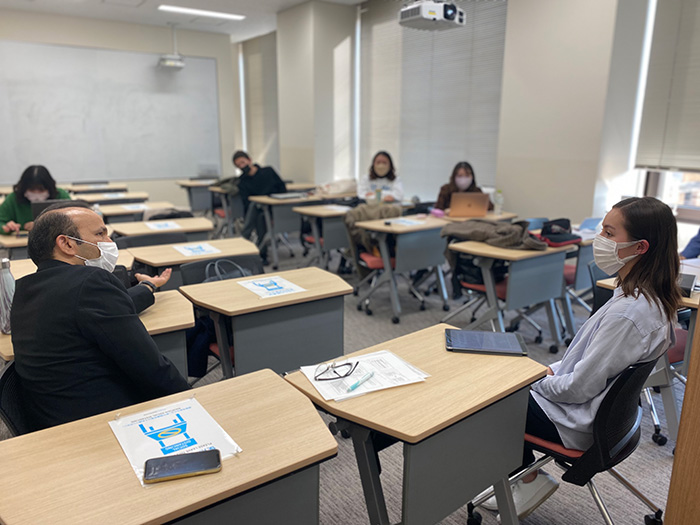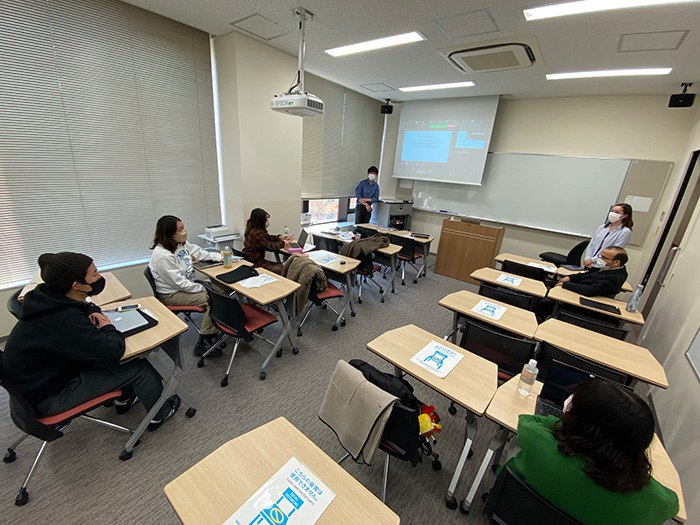授業紹介:SOCIETY AND POLITICS IN SOUTH ASIA
教員からのコメント Comment of Professor
Depth is a concept that I have cherised for many years now since Fr. Adolfo Nicolas invited us to be persons of depth and universality. In this seminar, we try to go deeper into issues to understand socio-political dimensions in South Asia both in depth and through a universal perspective. Students are invited to take up issues and discuss with their classmates and the instructor in depth as much as possible. The class style may depend on the participants passion and understanding, but overall, I challenge my students to be critical, deeper, and universal in their perspectives. Society and Politics of South Asia is an important subject that requires deeper study and better understanding. Partly because this is a subcontinent with a population that accounts for one fifth of the world’s population, characterized by complex diversity of religions, languages and ethnicity, and has increasingly begun to play a major role in global politics and economy. It is therefore important for the student to be more aware of the importance of this subcontinent, and be knowledgeable enough to be engaged in socio-political development of the region. Such an approach will help the students to become efficient leaders from Japan who are able to contribute in different ways to global efforts to make a better world.

学生からの声 class interview
This class focuses on the politics and society of South Asian countries. It is structured mainly through discussions, presentations, reading of subject literature, and writing reports. It is also one of the few courses offered in the Faculty of Global Studies to study South Asia in English.
Personally, I was interested in studying security in the Asia-Pacific region. I as well wanted to gain knowledge about India's domestic politics and society as it has been increasing its presence in the region in recent years. Similarly, I also was interested in the new trends of China's expansion into the region of South Asia. As the presence of China has been accelerating, I have been wondering how the region has responded to the expansion of China, both economically and through flexing its military power.

One of the best appealing points of this class is that students can express their opinion and discuss with other students in English. Since the class is structured to have small number of participants, there are several ample opportunities for the learners to express their opinion and raise questions. In addition, through a key approach where students research and present specific South Asian countries by themself, students are empowered to gain a stepping stone to acquire a more independent role in learning attitude, unlike the ordinary university lectures.
Although national foreign policy is likely to attract attention only for its specific actions, it is in the actual sense a reflection of domestic politics and society. When, for example, investigating India’s Asia-Pacific policy, I believe that it is possible to further deepen the understanding of India’s foreign policy by examining India’s domestic political and social conditions at the same time.
(Kensuke Murakami, 4th grade, Faculty of Global Studies)
In this class, we have been learning about the socio-political contexts of different countries in South Asia. At the beginning of the semester, Prof. Sali gave an overview of the region of South Asia. He also introduced the socio-cultural plurality of India and covered topics related to identity, conflict, and multiculturalism. From November, the class times have been used for student presentations. In these presentations, students present about an assigned country by giving an overview of the country and introducing a specific issue in that country. After the presentations, we have group discussions in which we ask questions and share our reflections with others in class.
I am a second-year student enrolled in the Department of Global Studies in Sophia Program for Sustainable Futures. In the Autumn semester of my first year, I took a course with Prof. Sali titled “Introduction to Area Studies.” Through this course, I became interested in South Asian area studies and wanted to learn more about this culturally rich and diverse part of the world. I decided to take “Society and Politics in South Asia” this semester because I hoped to acquire a more multi-dimensional perspective of South Asia and deepen my understanding of contemporary socio-political issues in the region. I also hoped to learn about the historical context behind some of the issues and challenges facing South Asia today.

One of the things that I find most attractive about this class is that it is interactive. Students are encouraged to ask questions and contribute their ideas in the form of weekly reaction papers, in-class discussions, and presentations. This gives us the opportunity to better internalize the information that we are learning and to expand our perspectives through exchanges we have with Prof. Sali and other students. I also find the interdisciplinary approach of this class attractive. That is, Prof. Sali introduces issues in South Asia from a wide range of disciplinary perspectives, from the humanities to the social sciences. This allows us to gain a more holistic understanding of the region of South Asia.
Through this class, I have become more familiar with the region of South Asia and learned about current challenges, from the Taliban takeover in Afghanistan to communal violence and civic relations in India. While these issues are specific to nations in South Asia, they have impacts on other parts of the world. At the same time, South Asia has been impacted and influenced in many different ways by countries in other regions. We are living in a highly interconnected global age, making it all the more important that we become familiar with the social and political issues of countries other than our own. What I have learned in this class is highly relevant to my studies, and based on the knowledge I have gained, I want to deepen my understanding of contemporary issues facing the world and apply a more critical lens when analyzing these issues.
(Mana Short, 2nd Year, SPSF Faculty of Global Studies)

この授業は南アジア地域諸国の政治と社会について、主に議論やプレゼンテーション、課題文献の講読とレポートの執筆を通じて学んでいく授業となっています。また、総合グローバル学科の開講科目の中で南アジアを学ぶ数少ない科目の一つです。
私はアジア太平洋地域の安全保障に関心があり、近年この地域でプレゼンスを高めているインドの国内情勢や社会についての知識を得たいと考えていたことに加え、インド洋地域に対する中国の進出も加速しており、経済的・軍事的な大国である中国の進出に地域がどのように対応しているのかも気になっていました。
この授業の魅力は英語で自分の意見を表明し、他の学生と議論を交わすことができることです。参加人数は少数であるため、自分の意見を言う機会が十分に設けられています。また、南アジア地域諸国について自ら調べ、プレゼンを行うことで、通常の大学の講義とは異なり、より主体的な学習姿勢を身に着ける足掛かりとなります。
国家の対外政策はその表面的な行動のみが関心を引きやすいが、実際には国内政治や社会の状況を反映しています。インドのアジア太平洋政策に関して調べる際には、同時にインドの国内政治・社会状況を合わせて調べることで同国の外交政策に関する理解を一層深めることができると考えています。
(村上健介 4年次 総合グローバル学部)
この授業では、南アジア各国の社会的・政治的な背景について学んでいます。学期の初めに、サリ先生より南アジア地域の概要についてご説明いただきました。インドの社会文化的多様性についてもご紹介くださり、その内容は固有性、紛争、多文化主義に関連するトピックにまで及んでいます。11月からは、授業内で、学生によるプレゼンテーションが行われています。このプレゼンテーションでは、学生が指定された国の概要や具体的な問題点を説明します。発表の後は、グループディスカッションを行い、互いに質問をし、自分の考えをクラスのみんなと共有する活動を行っています。
私は、総合グローバル学部の Sophia Program for Sustainable Futuresコース(SPSF)に在籍する2年生です。1年生の秋学期に、サリ先生の 「Introduction to Area Studies 」という授業を履修しました。この授業を通して、南アジア地域研究に興味を持ち、この文化的に豊かで多様性のある地域についてもっと知りたいと思うようになりました。今学期は、南アジアをより多面的にとらえ、現代の社会政治問題への理解を深めたいと思い、「Society and Politics in South Asia 」を履修することにしました。また、現在、南アジアが直面している問題や課題の背景にある歴史的背景についても学びたいと考えていたからです。
この授業の最大の魅力は、双方向性であることです。毎週のリアクションペーパー、クラスでのディスカッション、プレゼンテーションにおいて質問をし、学生自身の考えを発信することが、奨励されています。このため、サリ先生や他の学生との交流を通じて、学習したことをより吸収し、視野を広げる機会が得られます。また、このクラスの学際的なアプローチも魅力的です。サリ先生は人文科学から社会科学まで、幅広い学問領域から南アジアの問題について説明くださいます。そのため、南アジアという地域をより全体的に理解することができます。
この授業を通して、私は南アジアという地域をより身近に感じ、アフガニスタンのタリバンによる支配、インドのコミュナル暴力や市民関係といった現在の課題について学びました。これらの問題は、南アジア諸国特有のものですが、世界の他の地域にも影響を及ぼしています。同時に、南アジアは他の地域の国々からさまざまな形で影響を受けています。私たちは高度に相互に接続されたグローバルな時代に生きており、自国以外の国の社会的・政治的問題に精通することがより一層重要となっています。この授業で学んだことは、私の研究にも大いに役立っています。得られた知識をもとに、世界が直面している現代的な問題に対する理解を深め、これらの問題をより批判的な視点から分析していきたいと思います。
(ショート真菜 2年次 SPSF 総合グローバル学部)
